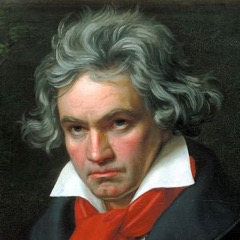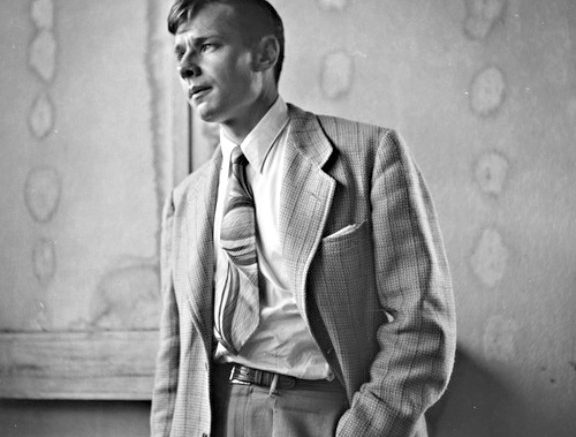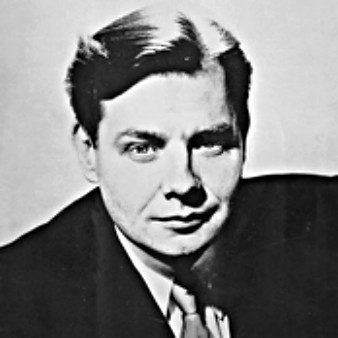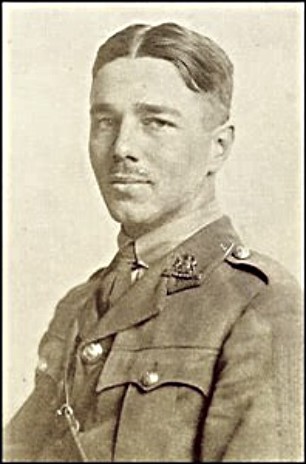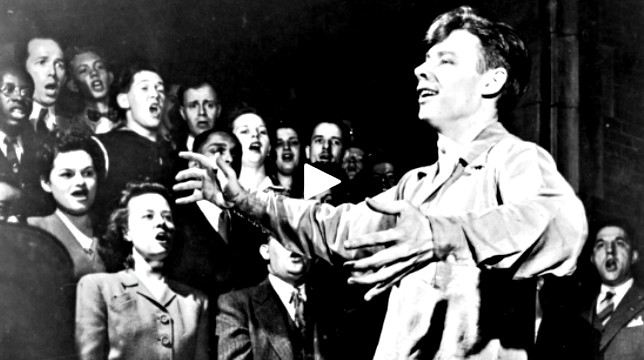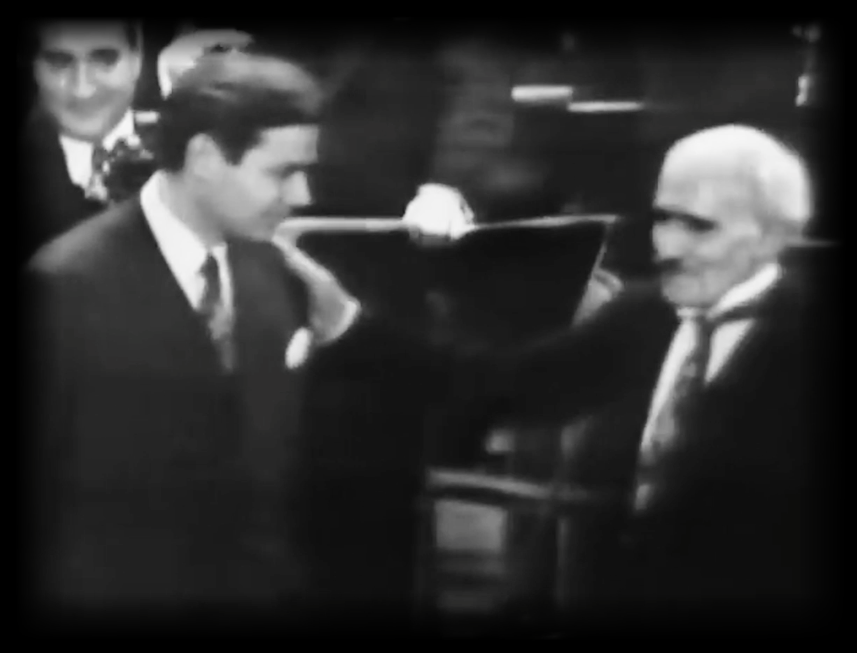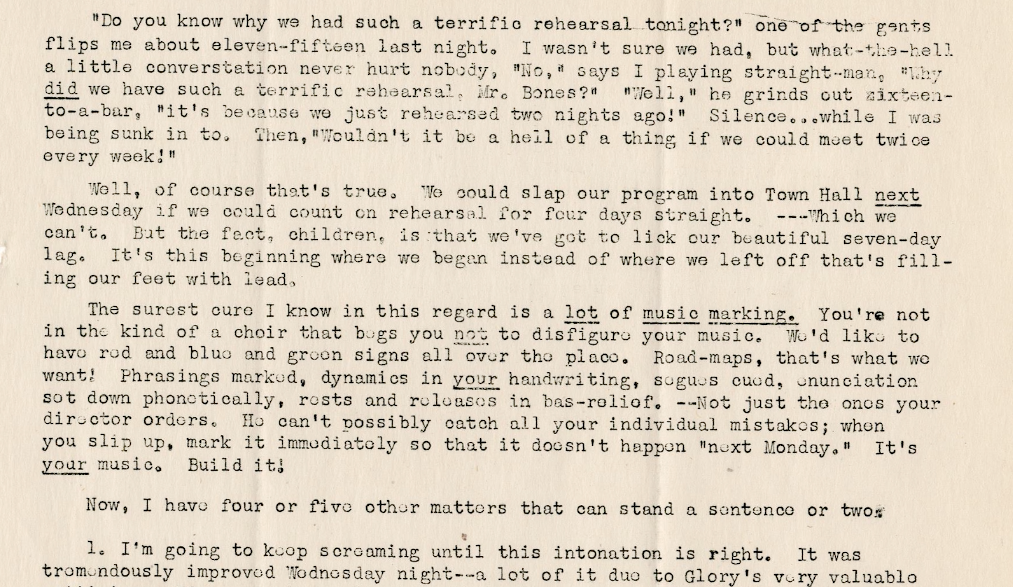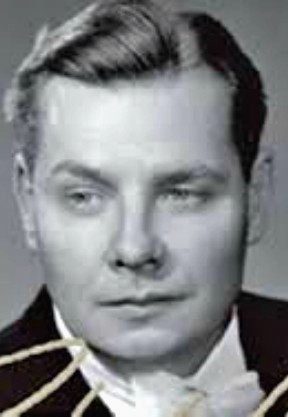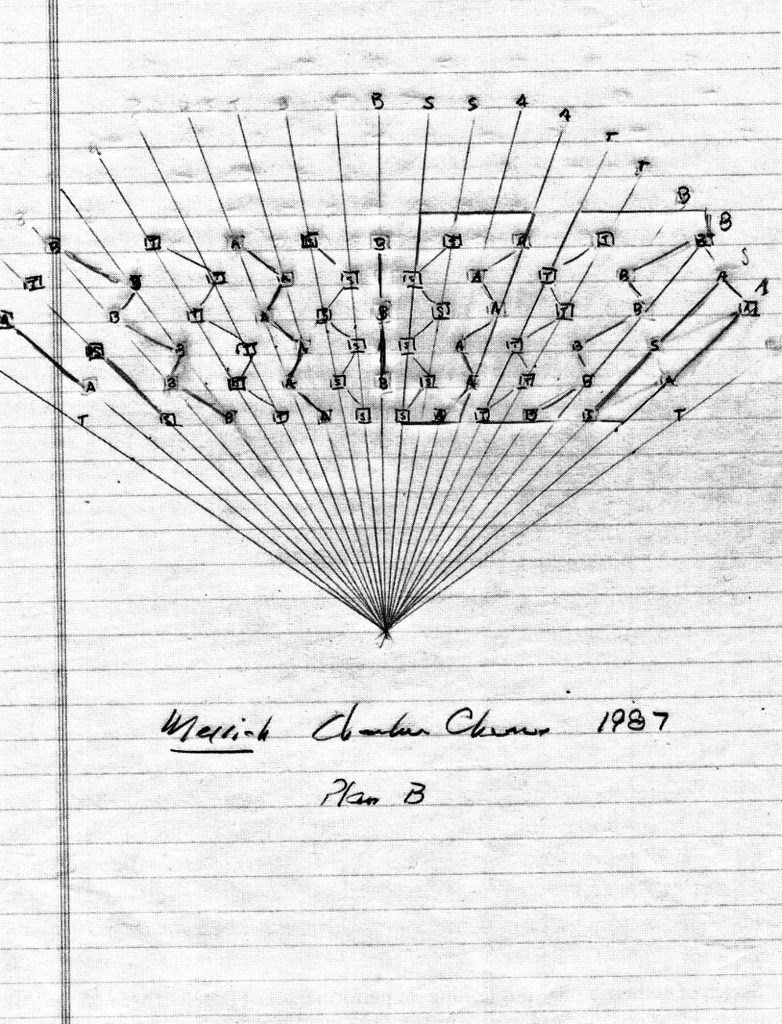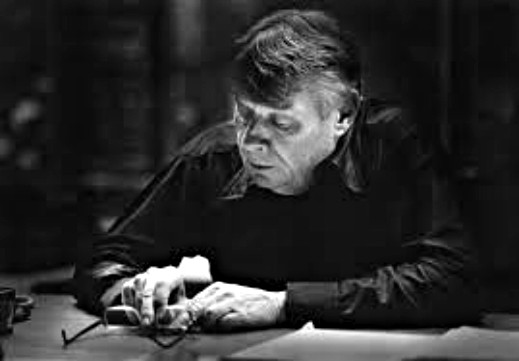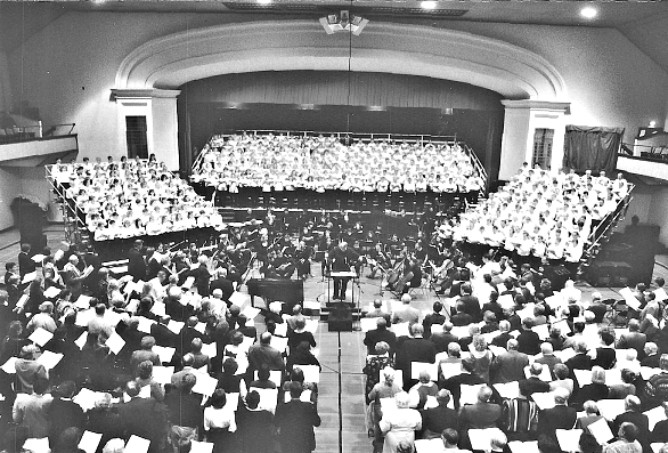Robert Shaw was born in Red Bluff, California in 1916. His father was an evangelical minister, and as a boy Robert became experienced conducting church choirs. At Pomona College Shaw studied comparative religion and English literature. During his junior year, Fred Waring, a popular bandleader, heard Shaw conduct the college glee club and offered him a job in New York City recruiting and conducting a male choir to sing with Waring’s band on the radio.
In 1941 Shaw established a volunteer chorus, the Collegiate Chorale. He called his chorus “a melting pot that sings”. Shaw wrote: “We had every shade, shape and color of human flesh; and we had every species of human ideology, philosophy, occupation and religious custom. Getting Negro and White, Jew and Gentile, all singing together, all striving for the mighty harmony? Isn’t that the first step toward solidarity?”
The money he earned from conducting on the radio for Fred Waring enabled Shaw to finance his volunteer Collegiate Chorale, from which he did not draw a salary. He paid its bills and commissions for new music out of his own pocket and conducted the world premieres of works by Copland, Hindemith, and Foss, and the American premieres of music by Bartok, Rodrigo and Poulenc.
Shaw rapidly gained a reputation as a well-respected choral conductor. His results with this chorus were so dramatic that he was asked to prepare choruses for the leading conductors and composers of the time, and in his 20s was appointed director of the choral departments at Tanglewood and Juilliard.
In 1944 Shaw became the first conductor to receive a Guggenheim fellowship grant. He used the money to hire a private tutor, Julius Herford, a German-Jewish refugee who specialized in harmonic and structural analysis, especially the choral music of Bach. Shaw studied with Herford, sometimes averaging 50–60 hours per week, when not touring, for approximately 10 years.
Shaw considered himself an agnostic and ironically spent much of his career conducting great musical settings of liturgical texts. He was opposed to the institutionalization of Christianity. To him preparing and performing Bach’s St. Matthew Passion or his Mass in B minor were acts of worship and were the greatest achievements of art known to humankind.
Shaw’s ideals and goals were social justice, religious tolerance, racial harmony, and world peace. He was a pacifist and during WW II and had registered as a conscientious objector. In July of 1944 Shaw’s younger brother was killed in Indonesia while serving there as a chaplain in the air force. When Robert returned home after his brother’s death, Shaw’s mother said something that haunted him for the rest of his life. She turned to Shaw and said: “It should have been you.” He forgave her, but was never able to forget it.
In 1961 the English composer, Benjamin Britten set to music parts of the Requiem liturgy interspersed with his musical settings of the poetry of his fellow countryman, Wilfred Owen. Britten’s ‘anti-’ War Requiem contains many of Shaw’s own values — pacifism and disdain for religious consolation in the face of slaughter. For Shaw war was simply the butchering of the young. He wondered how could anyone consider the slaughter and absurdity of war and not plead to the Almighty: Why? It had been Shaw’s question ever since his brother was killed.
Shaw wrote: “Wilfred Owen was killed in action just seven days before the end of WW I in 1918. Owen was only 25, but his poems are profoundly disturbing. They were not about what soldiers gloriously did, but what they had unforgivably been made to do to others. To Owen, war appeared as a hellish outrage on a huge scale against humanity, and a violation of Christianity. Owen is mourning young lives tormented and treated as expendable.
“The whole piece is an argument against war. One forgets that at the end of WW I they were inducting into the army 16-year-olds and thinking of taking 14-year-olds into the armed services. It was a terrible, terrible war. The constant running theme throughout all of Britten’s life is of innocence outraged. And he feels this same pervasive, infinite sense even down to the age of little children — outraged because they’re the next in line; they’re the next inductees. The Wilfred Owen poetry bewails the fact that youth is being massacred. Voices of boys are heard singing Latin texts peculiarly appropriate to the innocence of children.
“You’d have to have lived a few years before WW I to realize that that was the great dividing line. Up to that time science was going to save the world. Everything was going to be perfect. And from then on it’s been a century of war. I registered as a conscientious objector when the Second World War war came along. My brother went in as a chaplain. He was killed in the South Pacific as an air force chaplain. A bomb landed on his service one day — came down on the pulpit. Anyway, I do have a conviction that war is simply awful. I mean it’s just hellish and I don’t think anybody feels any different. This confrontation of Owen’s poetry means a lot to me. I just love to see man stand up against that. You know, don’t let the bastards get you down.
“Substantially, the poetry of Wilfred Owen says ‘Hell’s on earth and it’s in my dug out.’ And not only that; he says ‘There is no heaven; there is no assurance. The boys are dead…No mockeries for them from prayers or bells’ and such. Don’t think that by just simple religious observance you’re going to be able to wash away the tragedy.”
In 1945 and 1946 Shaw began making his first recordings. Some of the repertoire included Bach’s Magnificat, Cantata № 140 and several arias of Bach with the legendary contralto, Marion Anderson. In 1947 he conducted the first recordings in the United States of Bach’s Mass in B Minor and Brahms’s German Requiem!
In 1945 Arturo Toscanini engaged Shaw’s chorus to sing Beethoven’s 9th Symphony in Carnegie Hall. Toscanini had been conducting the 9th for 50 years. The old maestro’s humility deeply impressed Shaw when he modestly said to him: “You know, I have never had a good performance of this work. The soloists are frequently very bad, and the orchestra sometimes doesn’t play well, and frequently the chorus is not good, and I have never been able to do this piece. I’m always bad. It’s too big a piece; I don’t do it as well as I should.”
At a chorus rehearsal, he listened to Shaw conduct it, and then threw his arms around him, kissed him on both cheeks, and in tears said: “This is the first time I’ve really heard this piece sung.” Toscanini soon invited Shaw to guest conduct his NBC Symphony, stating: “I have at last found the maestro I have been looking for.”
In 1948, Toscanini again conducted the 9th, this time on TV. After the performance, Toscanini didn’t take a bow, but went off the stage and returned, pulling the 29-year-old Robert Shaw by the hand for a bow and patting him on the shoulder. For the remaining 9 years of Toscanini’s career, whenever he needed a chorus, he requested Shaw.
When he was in his seventies, Shaw wrote: “Arturo Toscanini, for all of us then, and still, the only ‘Maestro’. And he spoke to me about what he called “Toscanini’s extraordinary kindness and modesty. There was nobody that was kinder and sweeter.”
He usually refused to grant interviews to the press, and grumbled and complained about the interviews he did consent to. Shaw hated attending dinners and receptions. He once escaped from a reception given in his honor by climbing out through a window. Nick Jones, chorister and writer of the Atlanta Symphony program notes: “He was not interested in doing interviews, in socializing, in meeting big donors and that sort of thing. This all took away from his study time. He worked us hard but he worked himself so much harder.”
He wanted to be alone, studying the music again and again. No matter how many times he had already conducted a piece, he thought of each performance as another opportunity to get closer to what the composer wanted to say. Shaw worked on studying music up to 14 hours a day, constantly digging deeper. Caroline Shaw: “I did in the first years we were married try to insist upon some recreational activity, and I realized it was a fruitless pursuit. He sits in his studio and works 8, 10, 12, 14 hours a day.”
To work with and learn from Shaw, 175 conductors from around the country came to New York for one week each year during the 90s to intensely rehearse and perform with him and the Orchestra of St. Luke’s in Carnegie Hall. Fortunately, many hours of these rehearsals are on YouTube. Shaw nurtured countless choral conductors, many of whom went on to lead the choral departments at conservatories and universities across the country.
Throughout his career Shaw wrote letters to his chorus members, often right after a rehearsal. He poured his heart into these letters, writing about the compositions currently being rehearsed, the composers, and about what the music meant to him. The letters were mailed to each singer. Dawn Willis, chorister and conductor: “He would write us every week, the ‘Dear People’ letters. He would talk about the history of the piece, the composer, the nature of the text and all those things that you can’t fit into a rehearsal, but that he would share with us afterwards in his own personal sometimes angry, sometimes happy, always meaningful comments about the music that drove all of us as we headed into performances.”
Shaw commissioned Paul Hindemith to compose for the Collegiate Chorale; and moved by the horrors of WW II and the recent death of President Roosevelt, Hindemith set to music Walt Whitman’s poem When Lilacs Last in the Dooryard Bloom’d. Shaw paid Hindemith’s commission out of his own pocket. “It’s really ludicrous to think of it now. The commission which he accepted was a commission for one thousand dollars, and he wrote this 65 minute piece which he dearly loved.” Shaw conducted the world premiere on May 14, 1946. He wrote: “It has to do with private quiet grief and a lonely broken heart. Hindemith used the death of Lincoln as a metaphor not only for the deaths of Roosevelt and his own students, but for all the heroic and wasted lives consumed in the holocaust of WW II. When Lilacs Last in the Dooryard Bloom’d, A Requiem for Those We Love. The whole of Lilacs is a hymn for those he loved.”
At a chorus rehearsal of this work he said: “Singing a piece like this changes lives. Goddammit it changes lives. You don’t think the same anymore. You don’t cry over the same things. You don’t love the same way. You’re different. And it’s just too damn bad that humanity isn’t ready for it, that people aren’t ready for it. You know, it might even change a vote in Congress or something if enough… So that’s part of what I believe so much about the amateur arts. It’s great to raise singers to professional responsibility. That’s just fabulous. But our problem is to change not singers, but to change society.”
In 1948 Shaw established the Robert Shaw Chorale, a professional chorus of approximately 35 singers. The group sang regularly on the radio for 17 years and made over 100 recordings. Shaw’s true passion was for the music of Bach, Beethoven, and Brahms, and he was a champion of several 20th century composers, such as Stravinsky, Poulenc, Bartok, Hindemith, Ives, and Britten. However, he made many recordings of popular repertoire and recorded 7 albums of Christmas music. This popular repertoire was published in 223 arrangements by Shaw and Alice Parker that were widely used by school choirs, and featured in 17 record albums. The publication of this sheet music, the recordings, the frequent exposure on radio, appearances on TV, and his extensive concert tours resulted in Robert Shaw’s becoming a household name. His record company insisted Shaw record this lighter repertoire because the company then used the profits to finance recording the repertoire Shaw was much more interested in. And he spent a lot of his royalty income to subsidize some of his performances.
When Shaw was the music director of the San Diego Symphony from 1953–1956, he donated his salary and an additional several thousand dollars to improve the artistic conditions.
Shaw toured extensively with the Robert Shaw Chorale including international tours to 30 countries in Europe, the Soviet Union, the Middle East, Latin America, and 20 domestic tours to hundreds of cities in 46 states. Shaw wrote: “The choir and chamber orchestra would be on the road from 10 to 20 weeks at a time; giving 13 concerts in 14 days…Sixty-five B Minor Masses in seventy days? One hundred thirty Mozart Requiems in twenty weeks?”
Shaw drew detailed diagrams for the placement of the players, chorus, and soloists on various stages.
And throughout his 60-year career in hundreds of concert venues he personally set up the stages, placing every chair and music stand for the players and the chorus within a fraction of an inch! When on tour, after riding through the night and most of the next day on a bus, upon arrival in the next city Shaw and the road manager would build risers out of locker room benches and lunchroom tables for the chorus to stand on for that evening’s concert. And he used pieces of scenery and scrap lumber to improvise the construction of concert shells to project the sound out to the audience. On one tour Shaw injured his back while moving scenery.
In 1962 the U.S. State Dept., sent the Robert Shaw Chorale and Orchestra on a massive tour of 6 concerts in West Berlin, 4 in Yugoslavia, and during the Cuban Missile Crisis, 30 performances in an 11-city tour of Russia and Ukraine, where he conducted 10 performances of the Mass in B Minor. All seats and standing room tickets sold out well in advance, and people stood on line through the night and all the next day to buy standing room tickets! After the performances audience members remained in the concert halls on their feet, for up to an hour. Militia were stationed behind iron barricades to keep the crowds from breaking into the concert halls. Yet in Lvov, Ukraine, the crowd broke open the doors and stormed into the packed hall.
Shaw recorded the B minor Mass, all 2 hours of it, 3 times and said that if there was a god, the Mass in B minor would surely be god’s favorite music. He also brought Bach’s B minor Mass on tour to 8 countries in Latin America, and when he performed it on a tour of 37 American cities, he took a $20,000 personal loss because he wanted America to experience what he considered to be the pinnacle of artistic creation. “It is entirely possible that out of the whole history of the Western World, Bach is the single greatest creative genius…And it’s entirely possible that the B minor Mass is his greatest achievement. Whenever I have been involved in a performance of the B minor Mass or the St. Matthew Passion I simply have not operated humanly or socially with much charm or productivity for some hours afterwards and, on occasion when the luxury of leisure was available, for two or three days thereafter. Somehow, to me, these are ‘shocking’ works.” There were many times when he stayed in bed for two days after certain performances.
Marietta Simpson, mezzo-soprano: “One day we were in Carnegie Hall before a B Minor Mass, and he said: ‘Why do we still do the B Minor Mass? Because there’s somebody in the audience who’s hearing it for the first time, and somebody who’s hearing it for the last time. Why do we do this piece? Because there’s a boy sitting in a jail cell in Paducah, Kentucky who just shot up his class with a gun, asking for his mother to come home. That’s why we still do this piece.”’
In 1966 Shaw donated his services to conduct Beethoven’s Missa Solemnis in Lima, Peru. And he took a huge personal financial loss when he conducted a performance of the Missa Solemnis in Carnegie Hall in 1952 with the Robert Shaw Chorale. Shaw wrote that Beethoven’s Missa Solemnis is a “huge sacred symphony on a scale from gigantic to infinite.” While rehearsing Beethoven’s fiendishly difficult setting of the words: “And everlasting life. Amen”, he joked that he wanted no part of eternal life everlasting if it is going to be as frenzied as Beethoven imagined it! “It’s so extraordinarily explosive that a good Christian would say: ‘If that’s what it is, I don’t want anything to do with it, if it’s going to be that busy. I was looking to lie down a little, you know? Occasionally get a nap!”’
He loved to conclude the Robert Shaw Chorale concerts with spirituals. It was always a racially integrated chorus, and black soloists regularly sang with the group, facing harassment and physical threats when they toured the South. Shaw declared that he would refuse to perform anywhere the audiences were not integrated. Shaw also refused to patronize any hotel that wouldn’t house the entire group. By purchasing groceries and eating in their bus, picnic style, they boycotted southern restaurants that practiced racial discrimination. Shaw cried the first time he heard African-American tenor Seth McCoy sing. He featured McCoy as soloist during the 1962 tour of the Soviet Union, and in 1966 hired McCoy to sing Handel’s Messiah on a 6-week tour to 31 American cities.
Shaw was the director of the Cleveland Orchestra Chorus, and associate conductor of the Cleveland Orchestra under George Szell from 1956–1967. He left Cleveland against all advice to become the music director of the Atlanta Symphony from 1967–1988, after which he was music director emeritus and conductor laureate. In the 80s and 90s he conducted recordings of an enormous amount of choral repertoire with the Atlanta Symphony Orchestra and Chorus, many of which won Grammy awards.
Sylvia McNair, soprano: “He had many, many glamorous offers, but he chose to go to Atlanta in 1967 because he wanted to be part of the civil rights movement. He wanted to get involved in a place where his work and his voice could make a big difference for a lot of people. He could have gone many other places that would have paid him more and been more glamorous and drawn a higher quality of music making from the orchestra. But he wanted to get in the thick of it and fight for people who didn’t have someone like him fighting for them. He wanted to make a difference. He was a standard-bearer to be sure.”
Bryan Black, conductor: “Shaw wanted to step in and bridge those gaps or speak up for the little guy out there. He was obsessed with the struggle of right and wrong and justice and speaking up for the right things. And it seemed like that was something that was just always urging him forward, that he knew there were some things in the world that were not right, and that he was going to try to do something about it if he could.”
Nick Jones: “He came to Atlanta, went to the board of the Atlanta Symphony and said: ‘I don’t see any blacks on this board. You have theoretically integrated your audience but you’ve got to diversify.’ And the next year they had 3 black faces on that board. And he did many other things to try to incorporate African Americans into the Atlanta Symphony’s program.”
While music director of the Atlanta Symphony, he accepted few invitations to guest conduct other orchestras. His salary in Atlanta was very low. This gave him bargaining power at contract time to hire more and better players, and to spend money on publicity campaigns, education and outreach programs, and composers in residence. Shaw personally financed scholarships to send several musicians to attend summer festivals and workshops at Marlboro and Tanglewood. He extended the concert season, he constantly pushed for an increase to the budget, and he programmed a lot of contemporary music. Shaw’s early years, building the Atlanta Symphony, were very challenging. He said he sometimes felt as if he were trying to swim through cement. Shaw: “In very few years that orchestra grew from a budget of 250,000 dollars and 20 weeks a year to 52 weeks a year and a budget of now approaching 15–20 million.”
Bob Edge, Shaw’s lawyer: “He made it clear to me; he said: ‘I will not get into a dispute about money. So no one would believe how little he was really paid. It was pitiful. I mean he did have royalties coming in from all of those recordings, and he had many other opportunities. But making money was never his big thing; it was making the music that was his driving force. He never really had a manager that was aggressive on his behalf.”
In Atlanta, Shaw commissioned new music by African American composers. During Shaw’s first season he brought the Atlanta Symphony to Spelman College, the historically black liberal arts college for women, where he shared the podium with conductor Paul Freeman and programmed music by Adolphous Hailstork, Frederick Tillis, Billy Taylor, John Lewis, Arthur Cunningham, Ulysses Kay, George Walker, Olly Wilson, and T.J. Anderson.
Marietta Simpson: “The music that he made and his contribution to music were not just in concert halls and for performance. He had a social conscience in his music, and that was important to him: to have amateur musicians*, and bringing people together from diverse communities. That was such a big part of his life and his effect in the world at large. Huge. That’s just something I’ll never forget; that was a big part of his mission as well.”
*The large choruses Shaw trained throughout the U.S. were comprised of amateurs in that they were volunteers. Shaw wrote: “‘Amateur’ is not a dirty word. Its lineage is (Latin), amare, to love; amator, a lover. The amateur spirit in the arts is not necessarily limited to those who do not receive a weekly pay-check. The greatest musical amateurs in my life have been Pablo Casals and Rudolph Serkin — whose concert fees were the highest of the highest, but who lovingly poured them back into festivals and institutes for needy and gifted young artists…. Amateurism is our greatest gift to our civilization.”
In 1972 Shaw brought the Atlanta Symphony to Morehouse College, the private, all male African American college and Dr. Martin Luther King Jr.’s alma mater, where he held the Afro-American Music Workshop. The orchestra played music by several black composers including John W. Work, Howard Swanson, Hale Smith, Stephen Chambers, and Wendell Logan. In Atlanta Shaw actively recruited black and other minority musicians for the orchestra and for solo appearances, and appointed 2 black composers: Alvin Singleton and T.J. Anderson as composers-in-residence. In January of 1972 Shaw conducted the world premiere of Scott Joplin’s opera Treemonisha 61 years after it was 1s published, featuring students from Spelman and Morehouse in the chorus. Joplin had never been taken seriously as a composer, and Shaw felt an injustice had been done.
In 1977 Shaw conducted the Atlanta Symphony and Chorus for the inauguration of President Carter, who appointed Shaw to the National Council for the Arts.
His biographer, Keith Burris wrote that Shaw was manic-depressive. Until his 50s, Shaw was a functioning alcoholic. In 1973 he married his second wife, Caroline, whom he credited with having stopped his drinking so heavily. Although she was 20 years his junior, she died of cancer 4 years before him. They had one child and raised him together with another boy from her previous marriage. (Shaw had three other children with his first wife, Maxine Farley.) Caroline devoted herself to Robert. In his dressing room she would massage his shoulders and feet during intermissions. She took care of mundane tasks so he could devote his time and energy to studying music and preparing for the next rehearsal, performance or recording session. After her death it was discovered that Shaw didn’t even know how to write a check!
Mistakes haunted him after performances, especially if they were his own mistakes. Sometimes furniture got broken, or he might violently punch a wall with his fists. If a performance was flawed, Shaw would grab his street clothes from his dressing room and immediately leave the building. He would then walk the streets for hours. In Atlanta Shaw once walked all the way home in his concert attire, muttering and cursing the whole time. Conductor, Joseph Flummerfelt, recalled an incident while Shaw was on tour with the Atlanta Symphony. He had just conducted a concert in Tallahassee and was to appear next in Miami: “So I went back after the performance. He had disappeared. He had made a mistake. Well you know the self-immolation that could take place. So we couldn’t find him; we were looking for him. Then we finally found him in the street some place, just roaming around. And then he got into the car and said he wasn’t going to conduct; he wasn’t going down there. And the vocabulary could be pretty vivid. He wasn’t going to go. Well we got him to the Tallahassee airport and by that time I think he sort of calmed down. He was just so devastated that he had made a mistake. And it was the whole struggle of his insecurity. I mean a huge, huge gift the man was given that he never could quite embrace.”
Bob Edge, Shaw’s lawyer: “He was unbelievably generous in helping others develop their choruses, their music programs, their summer camps. It was an extraordinary act of generosity that lasted his entire life.”
Shaw’s last out-of-town engagement was 2 months before his death. His old friend and colleague, Elvera Voth, had started a prison choir in Kansas. Shaw had heart problems, and was forced to cancel some of his last conducting engagements, but not this one. Despite his declining health, Shaw traveled at his own expense to Kansas to conduct a sing-along to benefit the Arts in Prison program. Shaw believed the program could help offer a healing experience for the incarcerated. 1,275 people attended the event, which raised $25,000 and led to additional arts programs to help rehabilitate prisoners. Shaw’s mannerisms during the Sing-Along contrasted drastically from some earlier rehearsal behavior in his career. Voth: “He had to let go of things that might have tortured him or angered him in the past. It seemed a full victory of the angelic forces over the demons inside him that fought for his very soul for so much of his life.”
You may view the entire event here: https://www.youtube.com/watch?v=SoLzzeZik_0
And you can read more about this amazing event here: https://beethovenfestivalorchestra.org/robert-shaw-conducted-a-prison-choir-two-months-before-his-death/
In January 1999 he traveled to Yale University to see his son Thomas in a play. During the performance he had a massive stroke, and remained unconscious in the hospital until his death a day later. He was 82.
Shaw received 14 Grammy awards, 4 ASCAP awards for service to contemporary music, the American National Medal of Arts, France’s Officer of Arts and Letters, England’s Grammophone award, the Kennedy Center Honors, and 41 honorary doctorate degrees.
